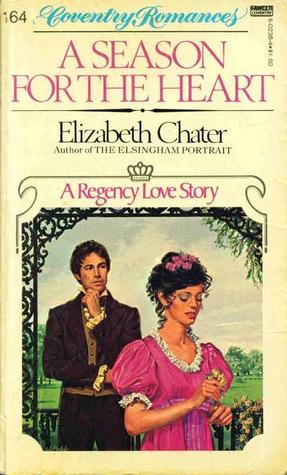 This book was so much fun! It was completely frivolous and silly, and yet there was something about it that just resonated with me. It helped that the hero is my favourite kind – sensible, honourable and witty, just the sort of man a hard-pressed heroine wants to be able to turn to in a crisis.
This book was so much fun! It was completely frivolous and silly, and yet there was something about it that just resonated with me. It helped that the hero is my favourite kind – sensible, honourable and witty, just the sort of man a hard-pressed heroine wants to be able to turn to in a crisis.
Here’s the premise: Miss Melpomene (!) Rand, called Pommy for short, is an orphan. Raised by her classical scholar grandfather, and now living as an unpaid and badly treated servant in her aunt and uncle’s house, she’s sent out in the rain to the local inn to collect a parcel from the incoming mail coach. Sheltering in the inn’s common room, she overhears a plot to hold up her uncle’s carriage the following day and steal the jewels. Running for help, she instead runs straight into the protective arms of a mysterious stranger…
Well, this is a Regency romance, so naturally the stranger will turn out to be a nobleman – the Earl of Austell, in fact, who summarily deals with the would-be highwaymen and sends Pommy straight home to get dry. When he discovers she’s forgotten the parcel she was sent to collect, he delivers it himself, and sees just how badly she is treated by her uncle and his family. Having discovered a mutual love of romantic fiction, he rescues Pommy and sweeps her off to London to be a companion to his widowed sister-in-law, collecting another stray young lady along the way. All this he takes in his stride – I do like a competent hero.
From here on, the plot becomes increasingly convoluted, involving the stray, her father and a discarded suitor of hers, Pommy’s horrid relations and her very un-horrid military uncle, and the earl’s sister-in-law and nephew, culminating in the obligatory kidnapping. Why is it that Regencies of this era always feel compelled to stuff in a kidnapping at the end? Fortunately, this one ends more in farce than anything else – in fact, the second half of the book is delightfully funny, with some genuine laugh-out-loud moments.
As for the romance, it’s obvious that these two are attracted to each other right from the start, and hooray for a hero who knows his own mind and doesn’t waver in the slightest. There’s a lot of muddle between them about what they really feel, with a great deal of miscommunication, and yes, it could all have been sorted out if they’d just sat down and talked to each other, which is usually a big red flag for me. But the whole thing is done in such a whimsical, light-hearted way, almost fairytale-like (and the parallels with Cinderella are obvious), it was easy to just roll with it. There was only one moment when I felt Austell behaved badly, when he first proposes to Pommy, but he makes it seem like such an off-the-cuff thing that she doesn’t take him seriously. A hero should never propose without explaining to the heroine that yes, he does love her, however spontaneous it might seem to be.
One oddity – we never quite know exactly how old the two are supposed to be. His sister-in-law says there’s almost a twenty year age gap, but there’s no particular reason why there needs to be. He says he’s had twelve seasons, so if he was up at Oxford, say, until he was twenty-one, that would make him in his early thirties. Pommy is spoken of as if she’s quite young, but I like to think of her in her early twenties, so the gap would be no more than ten years, and perfectly acceptable.
A couple of historical errors jumped out at me. The sister-in-law (the widow of the earl’s brother) is a duke’s daughter and the brother was a plain Mister, so she would be Lady Aurora Masterson, and definitely not Lady Masterson, as she is called throughout. And then there’s the question of whether Austell would marry his sister-in-law. Since they fall within the church’s proscribed levels of consanguinity, such a marriage would be frowned on. Legally, it’s possible, and two of Jane Austen’s brothers married the sister of their dead wife, but the marriage would be voidable – any challenge would render it void and the children illegitimate, and that’s not something that a peer could contemplate. Another small point – a hitching post is a term not common before 1850. In the country, a groom would be found to hold a horse, and in town street urchins did the job.
The book finishes in fine style, with a couple of satisfying side romances and a properly romantic denouement for the main couple, although like all books of this era, everything ends pretty much straight after the proposal. No schmaltzy epilogues here. Books of this age don’t always wear well, but this was one that I loved from start to finish, with clever dialogue and an excellent style of writing that reminded me of Georgette Heyer. Highly recommended. Five stars.

Leave a Reply